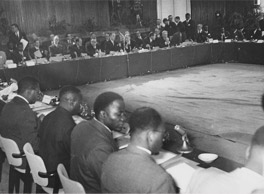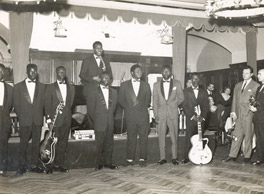ROUND TABLE
|
|
POLITICAL ROUND TABLE Palais des Congrès, Brussels, The first Round Table leads rapidly to agreement in principle on Congo's immediate independence, which is scheduled for 30 June. What independence means exactly and what form the future Congolese state will take, however, are left vague. Congolese leaders focus on the economic and social challenges but find no clear way forward. Nevertheless, when they return home, each will say, 'I've brought you independence' – in other words, freedom and wealth. Discussions take a crucial turn on 27 January 1960. Patrice Lumumba, freed from jail at the request of the Congolese delegation, arrives in Brussels on 26 January and joins the Round Table the next day. The Belgians propose a sovereign king for both countries, Belgium and Congo. The Congolese argue for the creation of a sovereign Congolese republic. Belgium wants to retain the Ministries of Finance, Defence, and Foreign Affairs. The Congolese counter-propose that Belgian civil servants who remain in Congo assume the titles of advisers and technicians, take on Congolese nationality, and share the same status (including financial) as Congolese. Lumumba asks repeatedly about the future of the two Belgian military bases in Congo: the Belgians reply that the answer will have to wait until after 30 June. In fact, they decide before that, during the Economic Round Table, when the Belgians manage to retain military control. >> Belgo-Congolese Round Table schema >> Portraits of the political Round Table participants INDÉPENDANCE CHA CHA!'In 1959, politicians were invited to negotiate independence at the Brussels Round Table. Thomas Kanza had the great idea of sending a telegram to his brother Philippe Kanza, asking him to form a band comprised of musicians from OK Jazz and African Jazz. We accepted the offer, me and Vicky Longamba, and from African Jazz Nico, Déchaud, his brother and Izeidi and of course the man himself Kabasele. The seven of us went to the Round Table.' Excerpt from interview with Armand Brazzos in Kinshasa in spring 2009. INDÉPENDANCE CHA CHA ! - THE SONGIn the songs 'Indépendance Cha Cha' and 'Table Ronde', the musicians tell the story as it's happening. 'Indépendance Cha Cha' cites the names of the most important Congolese delegates and their parties; 'Table Ronde' mentions Belgian delegates. 'Indépendance Cha Cha' is probably the most famous Congolese song. It soon becomes the independence anthem of other African countries. The Congolese song is an instrument of communication; the political song, in particular, plays an important role in Congolese society. INDÉPENDANCE CHA CHAIndépendance cha cha tozui e ASSORECO na ABAKO baykani moto moko Na MNC na UJEKO ABAZI na PNP Independence cha cha we gained it ASSORECO and ABAKO agree as though they're the same man From the MNC to the UJECO From ABAZI to the PNP Indépendance cha cha – Joseph Kabasele and African Jazz, ECONOMIC ROUND TABLEPalais des Congrès, Having agreed in principle on independence, the two parties are supposed to consider future economic ties at a second round table. But Congolese leaders do not attend, and instead prepare for the 15 May elections that will lead to the formation of their future government. With the election campaign in full swing, Patrice Lumumba (MNC), Joseph Kasavubu (ABAKO) and other leaders send students to represent them at the Economic Round Table. Some say that they're too young and inexperienced. But for Kasavubu, the meeting's sole purpose is 'to look at records', and he will ask for further explanation via a press conference. Yet these records include the central bank's reserves – in other words, the colony's holdings, estimated to be 35 to 37 billion Belgian francs. The Belgians are ready for the meeting and will recover the equivalent of what they gave up politically when they were caught unprepared at the first Round Table, including the maintenance of Belgian civil servants, their two military bases, and the significant 'portfolio' that is the root of Belgo-Congolese disagreement. At the end of this second Round Table, the Belgians fulfil their wish for a politically decolonized, economically subservient Congo. |




